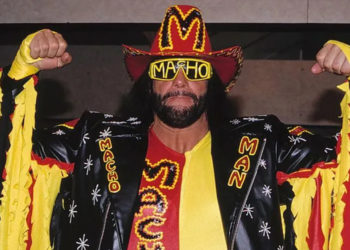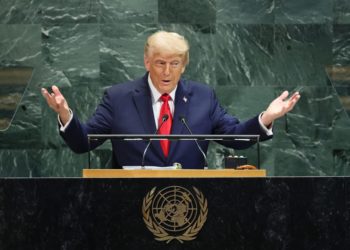When President Donald Trump describes his plans to deploy the National Guard to Memphis as a “replica” of what he’s done with federal troops in Washington, D.C., he’s attempting to make two points: first, that it’s appropriate for him to deploy the military in American cities at all, and second, that doing so effectively reduces crime in cities that just happen to be run and disproportionately populated by his perceived political foes. But the vision he has laid out to “make Memphis safe again” is familiar in another key way: It looks a lot like the crime-fighting strategy the city tried just a few years ago—one that ultimately failed.
The president signed an executive memorandum on September 15 directing federal agents to combat street crime in Memphis through “hypervigilant policing,” “aggressive prosecutions,” and “strict enforcement of applicable quality-of-life, nuisance, and public-safety laws.” The memo called for “large-scale saturation of besieged neighborhoods” and highlighted issues such as graffiti, noise, public intoxication, and traffic violations as areas of focus for federal agents set to descend on the city.
All of this sounds remarkably similar to what Memphis tried previously—an effort that, according to the Department of Justice, had disastrous results. “We have reasonable cause to believe that MPD and the City engage in a pattern or practice of conduct that violates the Constitution and federal law,” DOJ investigators wrote in a December 2024 report on the Memphis Police Department’s activities, sharply rebuking a policing style that managed to antagonize local residents while doing little to solve or prevent violent crime. “First, MPD uses excessive force. Second, MPD makes unlawful stops, searches, and arrests. Third, MPD unlawfully discriminates against Black people when enforcing the law.”
In response to that report—which found that crime had worsened despite the city’s constitutionally questionable crackdown—Memphis leaders said they had already intervened to stop the most egregious abuses. But with the support of Tennessee’s Republican state leaders, Trump now appears eager to return to the “saturation-style enforcement” that the Justice Department said was effective at arresting thousands of Memphians for traffic violations and nonviolent offenses but abysmal at catching the gang members and other criminals driving the city’s high violent-crime rate.
From the July/August 2008 issue: American murder mystery
As Trump redirects his anti-crime crusade to Republican-run states—St. Louis and New Orleans have been floated as targets for future troop deployments—the president is finding little resistance from their governors. This removes a significant obstacle that had complicated his plans to send Guardsmen into Chicago and Baltimore. But Memphis, like other blue cities in conservative states, is a fraught target for other reasons. Although Trump’s threats to send Guardsmen into states with a Democratic governor tend to spark unified opposition from state and local leaders, his recent pivot has exposed tensions between state and local officials over race, local control, gun laws, and tax dollars.
JB Smiley Jr., a member of the Memphis City Council, told me he feared that Trump’s federal surge would disproportionately target Black residents and undocumented immigrants for petty violations, while doing little to solve serious crimes and address gun violence. “If your goal is to send troops there hoping something goes wrong so that you can send in a more aggressive military occupation, then I think this is what you do,” he said.
Most of the people I spoke with in Memphis acknowledged that the city does have a serious crime problem. Although violence has decreased significantly this year—overall crime is at a 25-year low, police said this month—Memphis ended 2024 with the highest rate of violent crime in the nation, according to FBI data. In recent years, homicides have regularly topped 300 a year in the city of about 630,000—a murder rate that the White House recently noted was four times higher than that of Mexico City. When I asked officials in Memphis why the city’s crime rate had remained so high, several pointed to a 2021 state law allowing for permitless open carry of firearms, saying that it has exacerbated gun violence. In November, Memphis residents voted heavily in favor of a referendum opposing permitless gun ownership, although the superseding state law has blocked the city ordinance from going into effect. More than 90 percent of recent murders in the city involved a firearm. Trump’s memo on “Restoring Law and Order in Memphis,” however, does not mention gun violence.
Bill Lee, Tennessee’s Republican governor, has already begun dispatching dozens of state troopers into Memphis ahead of the expected arrival of federal troops. Lee, who went to the White House last week to personally thank Trump for the troop deployment, said he hoped the effort would result in “sustained crime lowering.” But Lee and the National Guard are still sorting out the details, which has delayed what had been expected to be an imminent deployment. It could be weeks before troops are in Memphis, a Pentagon official speaking on the condition of anonymity told The Atlantic. Among the challenges are federal budgetary concerns due to the end of the fiscal year and a possible government shutdown, the official said.
In the meantime, the state troopers have focused on traffic stops, issuing hundreds of tickets in recent days, local officials told me. The push is reminiscent of a strategy Memphians have become accustomed to—and, in many cases, annoyed with—even as their city has become more violent. Over a five-year period ending in 2023, officers in Memphis issued three times as many tickets as did their counterparts in the more populous city of Nashville, making 800,000 traffic stops and issuing 300,000 tickets, according to the Department of Justice. During that same period, murders in the city increased from 186 to 348 annually.
The strategy resembles one of the tactics federal agents have employed in Washington, D.C., during the surge that began last month. Police checkpoints were set up to stop people for traffic infractions, and officers tended to use the stops as an opportunity to check drivers’ immigration status or search for outstanding warrants. White House officials credit the highly visible efforts with bringing down rates of carjackings and other crimes, although criminal-justice experts have suggested that such decreases are likely to be short-lived. “There’s certainly literature out there that says increased police presence, in terms of the volume of law-enforcement officers, can reduce crime—but sometimes it doesn’t,” Nancy La Vigne, the dean of the Rutgers Newark School of Criminal Justice, told me. “And even if it works in the short run, it can do so much damage to community trust that it’s going to hurt in the long run.”
Trust between Memphis residents and law enforcement is already strained, said La Vigne, who led the Justice Department’s National Institute of Justice during the Biden administration. She cited the 2023 police killing of Tyre Nichols, who was beaten by several Memphis police officers after a traffic stop. Video footage of Nichols crying for his mother while being punched, kicked, and hit with a baton led to nationwide protests and ultimately forced MPD to disband a street-crime unit that had been known for escalatory practices.
The killing of Nichols, by members of that unit, also drew the attention of the Justice Department. Investigators launched a 17-month investigation of the Memphis police, which culminated in the aforementioned report. It found that Memphis officers would violently retaliate against people who mouthed off at them, punch and kick suspects who were already handcuffed, and engage in stop-and-frisk searches without probable cause. Black Memphians such as Nichols, the department found, were disproportionately targeted for abuse. In May, Trump’s DOJ closed its investigation into MPD and retracted the report’s findings. The five officers involved in Nichols’s death, who are also Black, have each either pleaded guilty or been convicted of various federal and state charges related to the killing. A Tennessee jury acquitted three of the officers on additional charges, including second-degree murder, in May.
Trump has regularly complained that departmental guidelines and constitutional restrictions force police officers to be less “tough” than the criminals they are pursuing. Speaking to New York City cops in 2017, Trump urged them to “please don’t be too nice” when making arrests. In recent days, he has repeatedly complained about police officers who stand still and accept a verbal onslaught from protesters yelling in their face. “I say when they spit, you hit,” Trump said at the White House last week, describing his advice to federal officials set to deploy to Tennessee. “You can do whatever you want. You do whatever the hell you want.”
In a statement, the White House spokesperson Abigail Jackson pointed out Memphis’s elevated crime rates and asserted that Trump’s efforts would reduce them. “Following the President’s highly successful operation to combat violent crime in DC, which objectively drove down crime rates across the board, numerous Tennessee officials have applauded the President’s decision to address crime in Memphis next,” she wrote. “Just as we did in DC, the Administration will work closely with local law enforcement to ensure the success and sustainability of the operation. Addressing crime will benefit all who live in and visit Memphis.”
The Memphis Police Department and Lee’s office did not respond to requests for comment. Trump’s push to send what he has called “rough-looking” federal troops into cities such as Memphis raises complex questions of race and class, Russell Wigginton, the president of the Memphis-based National Civil Rights Museum, told me. The museum, located at the site where Martin Luther King Jr. was assassinated, has been a gathering point when the majority-Black city has faced racial tension, he said. “For people of a certain age in Memphis, the connotation of the National Guard is traumatic—because they go straight back to imagery of Dr. King on that balcony in front of room 306,” he said, noting that thousands of Guardsmen deployed to the city before and after King’s murder, in 1968.
Read: The murders in Memphis aren’t stopping
Memphis’s mayor, its police chief, and most of the city’s officers are Black. The group of leaders Trump assembled last week at the White House to announce the “Memphis Safe Task Force” and discuss the city’s future—Lee, Senators Marsha Blackburn and Bill Hagerty of Tennessee, and a cadre of Cabinet officials—were almost exclusively white. Several Memphians I spoke with flagged the dynamic as troubling. Wigginton called it “jarring.”
City leaders have said they would welcome federal help to combat violent crime, particularly to address Memphis’s low clearance rates for the most serious offenses. Memphis police arrested a suspect in only 28 percent of murders in 2022 and 14 percent of murders in 2023, well below the national rate of 50 percent, according to FBI data. The clearance rates for nonfatal shootings have been even lower. Given the seriousness of the crime problem, Trump’s memo highlighting “public intoxication” and “unpermitted disturbances and demonstrations” has led to a fair share of eye rolling among local officials, Tami Sawyer, the general-sessions court clerk for Shelby County, which includes Memphis, told me. “They’re going to come arrest people for vagrancy and loitering and noise and graffiti, but they’re not going to take the guns out of circulation,” said Sawyer, who oversees much of the operation for the misdemeanor court cases and the jail in downtown Memphis.
She said that the jail is already overcrowded and the air-conditioning in one of the buildings went out earlier this month, leaving those inside to broil during 90-degree days. “We’re lucky that we haven’t had a riot yet,” she told me.
The Trump administration has done little to coordinate with local officials. Whereas Trump had the power to seize control of the D.C. police department and could rely on federal prosecutors to embrace his approach to charging crimes, the president’s authority is more limited outside the nation’s capital. A spokesperson for Shelby County District Attorney Steve Mulroy, who would be responsible for deciding whether to charge many of the people swept up in any crackdown, told me last week that he was still waiting to receive a briefing from the Trump administration.
Memphis Mayor Paul Young said he learned of Trump’s decision to deploy troops when the president made the announcement on Fox News. Young has said he opposes the idea. Several officials have pointed out that the Trump administration abruptly cut a $1.7 million grant for a local nonprofit focused on violence prevention, and will likely spend many times that amount on the troop deployment.
Meanwhile, residents told me that they have little choice but to wait and see whether the presence of soldiers once again marching through their city will deter crime or only further inflame tensions.
“Memphis has its problems just like any other city—but we’re not just this dystopia of foolishness and violence and crime,” Justin Brooks, who handles student recruitment for Christian Brothers University in Memphis, told me. “I hope that while the Guard is stationed here, that it actually benefits us. That’s the biggest thing. We fought enough about Is it going to happen? Now it’s going to happen, and it’s like, What now?”
Nancy A. Youssef contributed to this report.
*Illustration Sources: Drew Angerer / Getty; Valerie Plesch / Bloomberg / Getty; Brad Vest / Getty; Al Drago / Bloomberg / Getty; Houston Cofield / Bloomberg / Getty.
The post Trump’s Strategy to ‘Make Memphis Safe Again’ Has Failed Once Before appeared first on The Atlantic.




